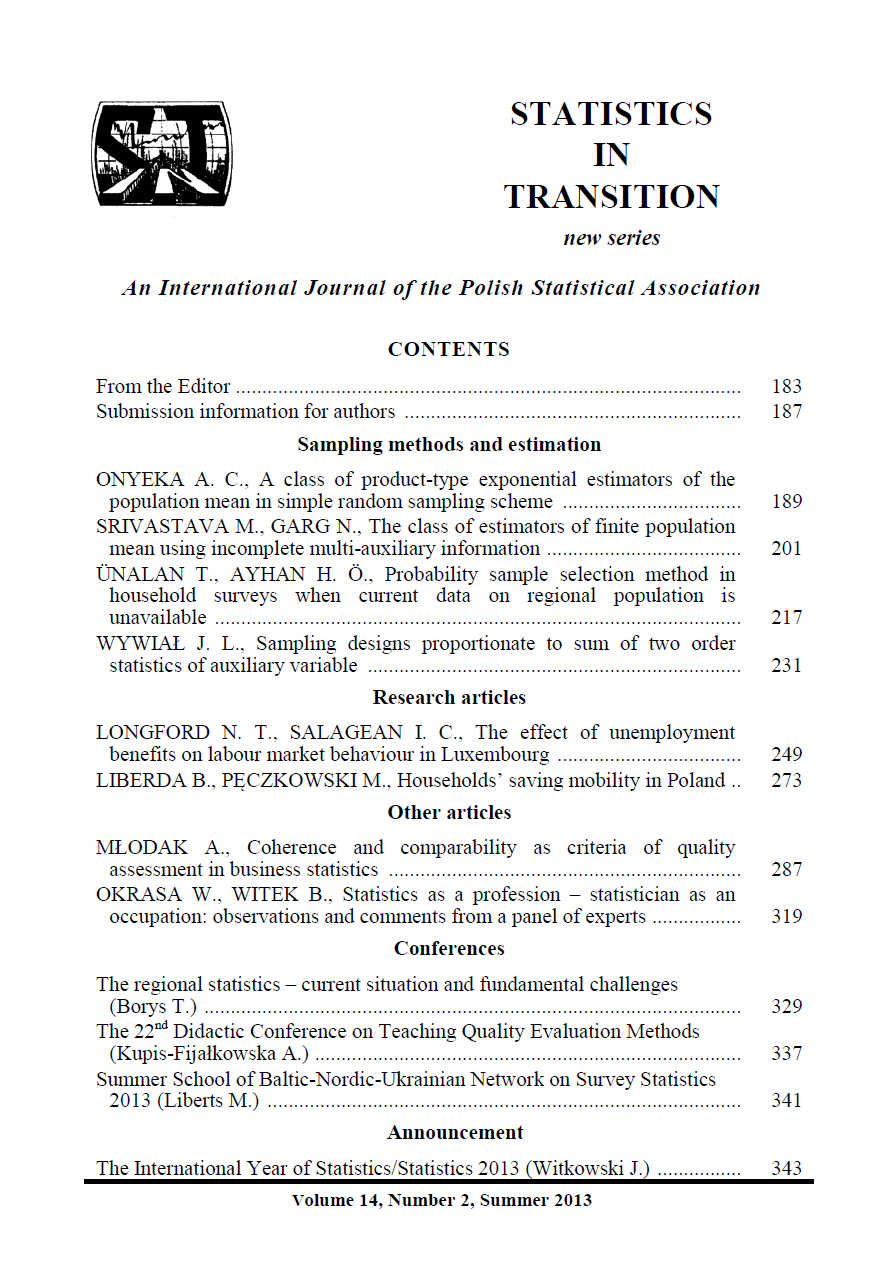ARTICLE
ABSTRACT
The present study proposes a class of product-type exponential estimators for estimating the population mean of the study variable, using known values of some population parameters of an auxiliary character, under the simple random sampling without replacement (SRSWOR) scheme. Furthermore, the study also proposes a modified exponential estimator based on both the ratio-type and the product-type exponential estimators. Properties of the proposed estimators, under the SRSWOR scheme, are obtained up to first order approximation. The modified exponential estimator under optimum conditions is shown to be more efficient than the simple sample mean and the ratio-type and product-type exponential estimators. The theoretical results are supported by an empirical illustration.
KEYWORDS
ratio-type and product-type exponential estimators, auxiliary character, simple random sampling, mean square error
REFERENCES
ABD-ELFATTAH, A. M., EL-SHERPIENY, E. A., MOHAMED, S. M.,ABDOU, O. F., (2010). Improvement in estimating the population mean in simple random sampling using information on auxiliary attribute. Applied Mathematics and Computation, Vol. 215, 4198–4202.
BAHL, S., TUTEJA, R. K., (1991). Ratio and Product type exponential estimator. Information and Optimization Sciences, Vol. XII, I, 159–163.
COCHRAN, W.G., (1977). Sampling techniques. 3rd edition. John Wiley and Sons, New York.
GROVER, L. K., KAUR, P., (2011). An improved exponential estimator of finite population mean in simple random sampling using an auxiliary attribute. Applied Mathematics and Computation, Vol. 218, No.7, 3093–3097.
KADILAR, C., CINGI, H., (2006). Improvement in estimating the population mean in simple random sampling. Applied Mathematics Letters, 19, 75–79.
KHOSHNEVISAN, M., SINGH, R., CHAUHAN, P., SAWAN, N., SMARANDACHE, F., (2007). A general family of estimators for estimating population mean using known value of some population parameter(s), Far East Journal of Theoretical Statistics, 22, 181–191.
ONYEKA, A. C., (2012). Estimation of population mean in post-stratified sampling using known value of some population parameter(s). Statistics in Transition-new series, 13(1), 65–78.
SHABBIR, J., GUPTA, S., (2010). Estimation of Finite Population Mean in Two Phase Sampling When Auxiliary Variables Are Attributes. Hacettepe Journal of Mathematics and Statistics, Vol. 39, No. 1, 121–129.
SHARMA, B., TAILOR, R., (2010). A New Ratio-Cum-Dual to Ratio Estimator of Finite Population Mean in Simple Random Sampling. Global Journal of Science Frontier Research, Vol. 10, Issue 1 (Ver. 1.0), 27–31.
SINGH, R., CHAUHAN, P., SAWAN, N., SMARANDACHE, F., (2009a).Improvement in estimating the population mean using exponential estimator in simple random sampling. Bulletin of Statistics & Economics, Vol. 3, A09, 13–18.
SINGH, R., CHAUHAN, P., SAWAN, N., SMARANDACHE, F., (2011).Improved exponential estimator for population variance using two auxiliary variables. Italian Journal of Pure and Applied Mathematics, No. 28, 101–108.
SINGH, R., KUMAR, M., CHAUDHARY, M. K., KADILAR, C., (2009b).Improved exponential estimator in stratified random sampling. Pakistan Journal of Statistics and Operations Research, Vol. V, No. 2, 67–82.
SINGH, H. P., TAILOR, R., (2005). Estimation of finite population mean using known correlation coefficient between auxiliary characters. Statistica, Anno LXV, 4, 407–418.
SINGH, H. P., VISHWAKAMA, G. K., (2007). Modified exponential ratio and product estimators for finite population mean in double sampling. Austrian Journal of Statistics, Vol. 36, No. 3, 217–225.
SUKHATME, P. V., SUKHATME, B. V., (1970). Sampling theory of surveys with applications. Iowa State University Press, Ames, USA.
TAILOR, R., SHARMA, B. K., (2009). A Modified Ratio-Cum-Product Estimator of Finite Population Mean Using Known Coefficient of Variation and Coefficient of Kurtosis. Statistics in Transition-new series, Jul-09, Vol. 10, No. 1, 15–24.
TAILOR, R., TAILOR, R., PARMAR, R., KUMAR, M., (2012). Dual to ratio cum-product estimator using known parameters of auxiliary variables. Journal of Reliability and Statistical Studies, Vol. 5, Issue 1, 65–71
